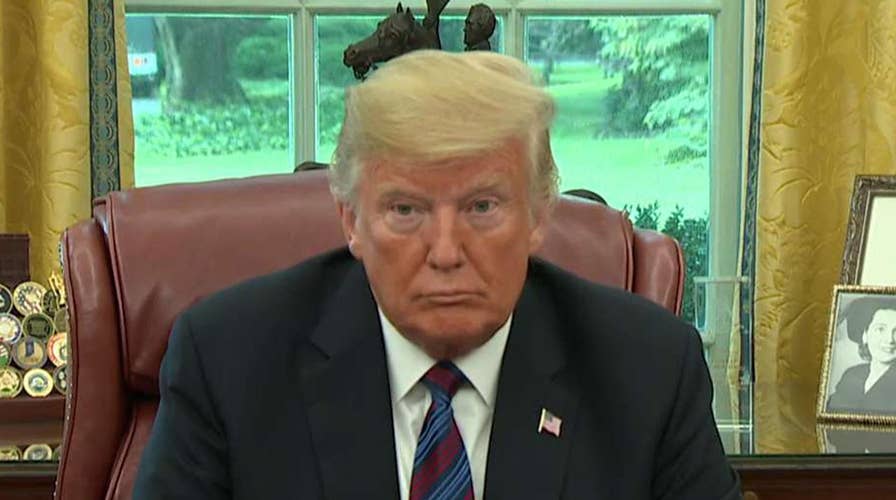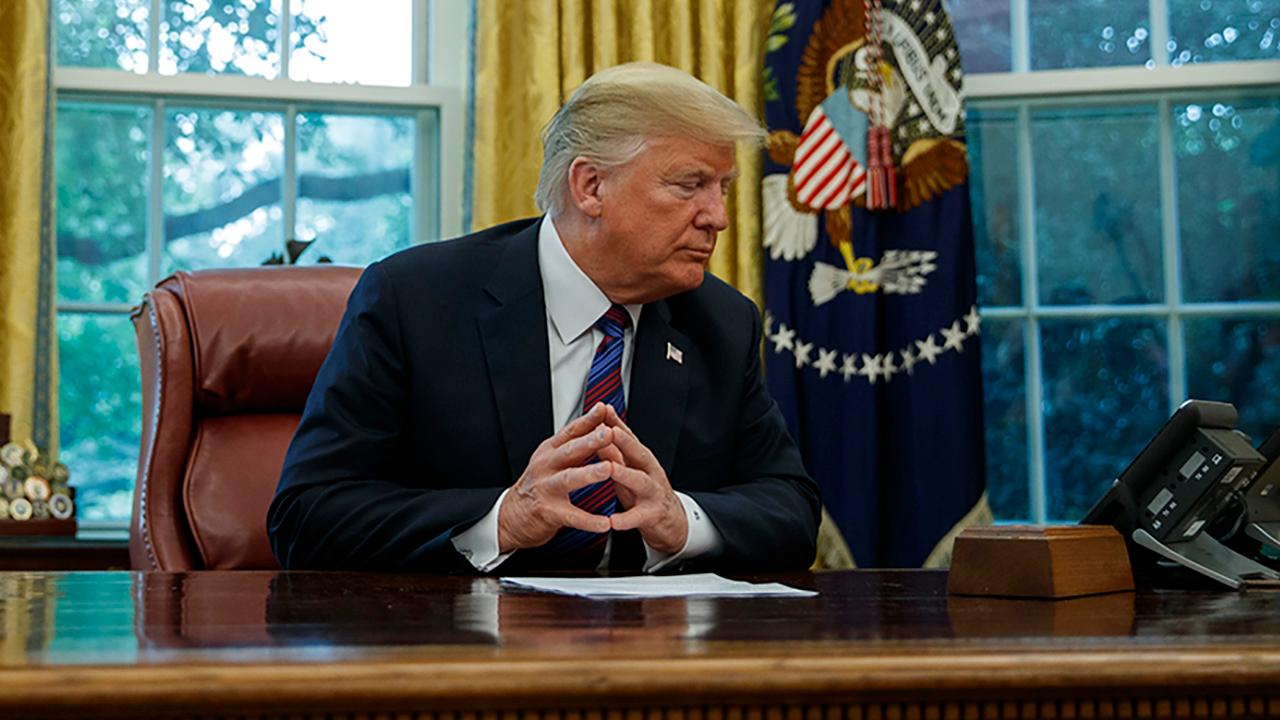President Trump announces new trade deal with Mexico
Joined on the phone by Mexican President Enrique Peña Nieto, President Trump announces the United States-Mexico Trade Agreement, an understanding with Mexico that could lead to overhaul of NAFTA.
President Trump on Monday said he plans to terminate the existing North American Free Trade Agreement, as he announced a new tentative agreement between the United States and Mexico that he described as "one of the largest trade deals ever made."
"I'll be terminating the existing deal and going into this deal," the president said in the Oval Office, calling it a "big day for trade."
But the president said Monday “we’ll see” if Canada can still be part of the trade pact, leaving open the possibility of separate agreements.
"We are starting negotiations with Canada pretty much immediately," Trump said.
Trump, sitting at the Resolute Desk, put Mexican President Enrique Peña Nieto on his speaker phone as the press watched in the Oval Office. The Mexican president, speaking through a translator, congratulated the negotiators on both sides and expressed hope the United States and Canada would come to an agreement.
Later, the White House said Canadian Prime Minister Justin Trudeau congratulated Trump. "The leaders discussed US - Canada trade and agreed to continue productive conversations," White House officials said.
Earlier in the day, Trump said he wanted to get rid of the name “NAFTA” because it has bad connotations. He said he planned to call the deal the "United States-Mexico Trade Agreement" instead.
The United States Trade Representative called the U.S.-Mexico deal a “preliminary agreement in principle, subject to finalization and implementation.”
“They used to call it NAFTA, we are going to call it the United States-Mexico Trade Agreement, and we will get rid of the name NAFTA,” Trump said. “It has a bad connotation because the United States was hurt very badly by NAFTA.”
Trump on Monday called it "one of the largest trade deals ever made." The U.S. and Mexico have been working to resolve key differences on issues ranging from automobiles to energy.
According to a fact sheet from the United States Trade Representative, the agreement includes new rules of origin to incentivize manufacturers to source goods and materials in North America – including requiring 75 percent of auto content be made in the United States and Mexico.
Officials in Canada, though, on Monday still expressed optimism over a deal.
“Canada is encouraged by the continued optimism shown by our negotiating partners,” a spokesman for Canada's minister of foreign affair, Chrystia Freeland, said Monday. “Progress between Mexico and the United States is a necessary requirement for any renewed NAFTA agreement.”
During the 2016 presidential campaign, Trump often railed against the trade pact as “the worst trade deal maybe ever signed anywhere.”
Trump and Peña Nieto have been working for the past five weeks to iron out their bilateral differences so Canada can rejoin the talks to update NAFTA. The U.S. and Mexico wanted to finalize an agreement this month so that it can be signed ahead of Mexican President-elect Andrés Manuel López Obrador’s inauguration in December.
One of the biggest issues on the negotiating table deals with car manufacturing jobs, as the Trump administration pushes for a deal that would boost factory employment in the U.S.
U.S. Trade Representative Robert Lighthizer and Mexican Secretary of Economy Idelfonso Guajardo were seen walked together Monday into the White House without talking to reporters. The delegation also included Jesus Seade, a World Trade Organization veteran tapped by Lopez Obrador as his future chief trade negotiator.
The U.S. on Thursday agreed to keep the 2.5 percent tariff currently applied under World Trade Organization rules if the cars are made at factories that already exist, which leaves open the possibility that automobiles that are built at new plants could face tariffs of 20 percent to 25 percent.
Trump has also signaled that he is open to negotiating trade deals with Mexico and Canada separately, while both countries have said they want to keep the three-nation trade deal that dates back to 1994.
Earlier in August, Trump threatened Canada with auto tariffs if the U.S. and Canada can't forge a deal.
"Canada must wait," Trump tweeted. "Their Tariffs and Trade Barriers are far too high. Will tax cars if we can't make a deal!"
Canada responded with a statement Friday night, saying: "Our focus is unchanged. We'll keep standing up for Canadian interests as we work toward a modernized trilateral NAFTA agreement."
Adam Austen, a spokesman for Canada's foreign minister, added: "We're glad Mexico and the U.S. continue to work out their bilateral issues. It's the only way we'll get to a deal."
Fox News’ John Roberts, Susan Li, Mike Arroyo and The Associated Press contributed to this report.














































